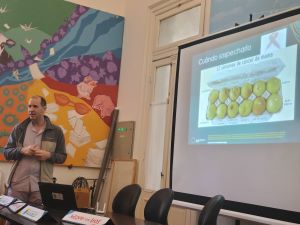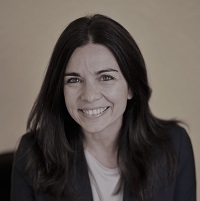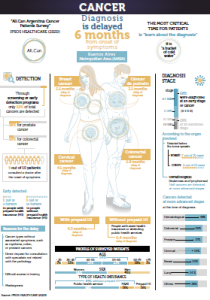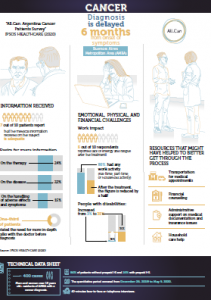
Author: Eugenia De la Fuente
on behalf of All.Can Argentina

All.Can Argentina patient survey results show that an average time from the onset of symptoms until the patient is diagnosed with cancer is about six months. Only 12 out of 100 patients learn about their cancer before the first signs and symptoms appear. The findings show that some variables can even extend the time of detection beyond six months: cancer types without associated symptoms, such as myeloma, colon or prostate cancer; direct request for a consultation with specialists not related to the pathology; difficult access to testing; and misdiagnosis: One respondent said, “I was treated for haemorrhoids for a year and a half.”
All.Can Argentina surveyed 400 patients residing in the Buenos Aires Metropolitan Area (AMBA)[1] during December 2019 – March 2020. The survey methodology included 40-minute face-to-face or telephone interviews. It included patients from both public and private health services.
Furthermore, these results are complemented with what we observed in our previous exploratory analysis “Barriers along the continuum of cancer patient’s care in Argentina: a preliminary qualitative exploration”. This work identified and categorized 42 barriers or obstacles interfering to different degrees in the prevention, diagnosis and effective treatment of cancer. Among these barriers analysis included: the lack of campaigns and other public policies for prevention and early detection, unequal access to screening tests and the disruption of screening strategies. This last barrier mentioned refers to the need for resources and trained healthcare workforce to act in a coordinated and timely manner when a positive test result requires additional studies or procedures.
Worldwide, Argentina is among the countries with a medium-high cancer incidence. According to the International Agency for Research on Cancer (IARC) data collected by the National Cancer Institute, in 2018 Argentina had an incidence rate of 212 cases per 100,000 inhabitants (for both sexes and excluding non-melanoma skin tumors)[2]
Targeting primary care professional awareness and education
Based on the information gathered, All.Can Argentina decided to promote actions which could shorten the time between the first consultation with the patient and cancer diagnosis. The work is focused on training of primary care physicians. We’ve set the objective to raise awareness in primary care physicians in screening strategies, how to suspect a diagnosis, and educate about the resources available for diagnosis and the referral circuit.
As part of a long-term program, the first approach (pre-COVID-19 pandemic) we took was to organize training meetings in small cities across the country with primary care teams and oncologists. All.Can Argentina carried out a first successful training in Saladillo in Buenos Aires, where during 1.5-hour long session, an oncologist explained different topics related to diagnosis and early detection focusing on the most common tumor types in Argentina: lung, breast, colon, cervical cancer. Related materials were prepared for the meeting, including illustrative posters and brochures with information. (See resources).
As many things across the world due to COVID-19 pandemic, the program had to adapt. We are now finalizing the production of special video series with a group of referral oncologists which includes a brief general overview and separate sections for four different tumor types – breast, colorectal, lung and cervical cancer. Each section contains data of disease burden in Argentina, risk factors, interventions for prevention and early detection, data on symptoms and reason for consulting and algorithm for managing symptomatic patients. Videos will strategically be shared with Primary Care Centers around the country.
Argentina has a robust public network of Primary Care Centers that provide essential health care in an accessible and equitable way. This is important considering that health insurance matters. According to our patients’ survey, among those with prepaid health insurance, almost 1 out of 4 cancers are detected early before the onset; for the rest of the patients, only 1 out of 10.
In words of Ignacio Zervino, Coordinator of Lung Cancer Patients Foundation in Argentina (FPCP), “At present, the main challenge for oncology in these times is undoubtedly early detection. That is a commitment of the entire healthcare system. The contribution of oncologists in this area should focus on improving the use of screening tools. If a little more than 10% of diagnoses derive from the population taking part in such tests, that is the way to go. It will not only save many lives but also make health costs more efficient.”
[1] The sample was weighted to represent the proportions of each cancer type according to Globocan 2018 estimates
[2] https://www.argentina.gob.ar/salud/instituto-nacional-del-cancer/estadisticas/incidencia
Download infographic – Cancer Diagnosis

